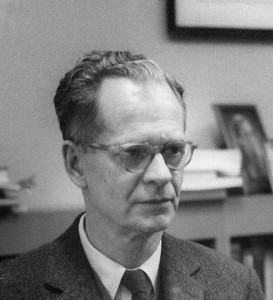
| Born: March 20, 1904 in Susquehanna, PA |
| Died: Aug 18, 1990 (at age 86) in Cambridge, MA |
| Nationality: American |
| Fields: Psychology |
| Famous For: Operant conditioning |
| Awards: National Medal of Science (1968) |
B. F. Skinner is a famed psychologist, inventor, social philosopher and behaviorist. He proved to be an accomplished psychologist by writing an entirely new chapter in behavioral psychology. His theories on behaviorism have made a huge impact on the development of a revolutionary school of thought referred to as Radical Behaviorism.
Birth and Early Years
Burrhus Frederic Skinner was born on March 20, 1904, in Susquehanna, Pennsylvania. He was the son of a lawyer. Skinner described his childhood as “stable and warm.” As a young child, he enjoyed inventing and building things. This skill would later be seen in his psychological experiments.
Skinner wished to become a professional writer after he graduated from Hamilton College, New York, in 1926 with a Bachelor of Arts degree in English Literature, but he was not successful in this venture. Two years later, he opted to pursue a new direction for his life. He joined Harvard University to study psychology where he later got his Ph.D. in 1931.
In 1936, B. F. Skinner married Yvonne Blue; they had two daughters together, Deborah and Julie.
Skinner’s Career
B. F. Skinner accepted a position as the psychology department chair at the University of Indiana and moved to Bloomington in 1945. Three years later, he became part of the Harvard University Psychology Department where he stayed for the rest of his working life. Skinner’s work majorly contributed to the development of experimental psychology and he is a key figure in the field of behaviorism. He was the inventor of the Skinner box.
The Skinner box
While at Harvard, Skinner was in search of a more measured and objective way to study behavior. In order to do this, he developed what he referred to as an operant conditioning apparatus, which later came to be known as the Skinner Box. Using the Skinner Box, he was able to study the interaction of an animal with its environment. He initially studied rats, observing how rodents learned to obtain food by pressing a lever.
Later, he examined the behavior patterns developed in pigeons by using the Skinner Box. In order to gain access to food, the pigeons had to peck at a disc. From the studies, B. F. Skinner was able to conclude that a form of reinforcement is needed when learning new behaviors.
Contributions to Psychology
B. F. Skinner published over 20 books and about 200 articles regarding the field of psychology. Despite the fact that behaviorism ceased to become a dominant area of thought, his work in operant conditioning still remains important. Professionals in the field of mental health utilize operant techniques when treating patients, animal trainers greatly rely on operant techniques to train, and teachers commonly use punishment and reinforcement to shape a pupils behavior in class.
Awards and Recognition
Skinner has earned several awards for his work in psychology. In 1958, the American Psychological Association awarded him the Award for Scientific Contributions. He also received the Scholar Hall of Fame award from the Academy of Human Resource Development. Several accredited universities, such as Johns Hopkins University, Harvard University, the University of Chicago, McGill University and Alfred College have given Skinner honorary degrees.
Death
B. F. Skinner died of leukemia at the age of 86 on August 18, 1990.